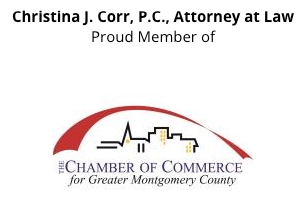Client Login
Client Login
×Recent Blog Posts

By Christina Corr
•
January 13, 2026
If you are involved in a child custody case in Pennsylvania, the court’s decision will be guided by specific factors known as the Pennsylvania custody factors. Under 23 Pa.C.S. § 5328, Pennsylvania courts are required to evaluate eleven custody factors (reduced and simplified from the prior sixteen), to determine what custody schedule serves the best interests of the child. In Montgomery County, Pennsylvania, these custody factors must be attached to every custody petition filed with the court, making them a required and central part of every custody case. Judges do not decide custody based upon gender, who files first, who earns more money, or which parent wants custody more. Instead, custody decisions are based on a careful, fact-specific analysis of these custody factors, with the child’s safety and overall well-being as the primary concerns. The factors are: 1. Which party is more likely to ensure the safety of the child The first and most important custody factor is which parent is more likely to ensure the safety of the child. This includes physical safety, emotional security, and psychological well-being. 2. The present and past abuse committed by a party or member of the party's household The court must consider any history of child abuse, involvement with child protective services, violent or assaultive behavior, and any Protection From Abuse or sexual violence orders where there has been a finding of abuse. Findings of abuse can significantly impact custody outcomes and will be given substantial weighted consideration by the court. If there is real safety risk, everything else takes a back seat. Not to punish parents, but to protect children. The court also evaluates the level of cooperation and conflict between the parties. This includes which parent is more likely to encourage and permit frequent and continuing contact between the child and the other parent as long as such contact is consistent with the child’s safety needs. Courts will consider attempts by a party to turn the child against the other party, except in cases of abuse where reasonable safety measures are necessary to protect the safety of the child. Courts won’t assume a child’s poor relationship with one parent was caused by the other parent. Absent abuse, judges expect parents to encourage and support healthy, safe contact with the other parent. That means not blocking communication, not interfering with the other parent’s custody time, and not bad-mouthing the other parent. 3. Willingness and ability of a party to prioritize the needs of the child This factor includes consideration of the parental duties performed by each parent in the past, whether the parent is willing and able to perform those duties in the future, and the ability to attend to the child’s daily physical, emotional, developmental, educational, and special needs. Courts consider who handles school, doctors’ appointments, meals, and routines, and who shows up when the child needs help. This matters much more than who “wants” custody more. Courts value consistency, reliability, and demonstrated caregiving over future promises or intentions. 4. The need for stability and continuity in the child's education, family life and community life, except if changes are necessary to protect the safety of the child or a party Courts generally prefer to maintain existing family relationships, school enrollment, home routines, and community connections, unless a change is necessary to protect the child’s safety or improve the child’s well-being. Children do best with consistency. Big changes are not taken lightly unless they clearly improve the child’s well-being. 5. The child's sibling and other familial relationships Pennsylvania courts try to keep children connected to siblings, and preserve meaningful family bonds whenever possible. Those relationships help children feel grounded and secure. 6. The well-reasoned preference of the child, based on the child's developmental stage, maturity and judgment While children do not get to choose where they live, the court may give weight to a mature child’s thoughtful, well-reasoned preference, particularly when it aligns with the child’s best interests and is free from pressure or manipulation by parents. 7. The proximity of the parties’ residences Courts consider how close the parties live to each other, because distance can affect school enrollment, transportation, transitions between homes, and the child’s daily routine. Closer homes make it easier to share custody. 8. Each party's employment schedule and availability to care for the child or ability to make appropriate child-care arrangements Employment alone is not a problem, but courts examine how work schedules realistically affect parenting time and availability. Does your employment schedule allow you to be present during your custodial time? Does it create gaps in supervision? If so, consider adjusting your work schedule or your custody schedule so you are available to care for your child during your custodial time. 9. The history of drug or alcohol abuse of a party or member of a party's household Courts consider the history of drug or alcohol abuse of a party or a member of a party’s household, to the extent that it impacts parenting ability and child safety. 10. The mental and physical condition of a party or member of a party's household Courts consider the mental and physical condition of a party or a member of a party’s household, to the extent that it impacts parenting ability, care, stability and child safety. A diagnosis alone is not determinative. Rather, the court focuses on functional impact, compliance with medication and treatment, and how these issues affect the child’s daily life. 11. Any other relevant factor The court may consider any other relevant factor necessary to reach a custody determination that serves the child’s best interests. Why this matters In Montgomery County, Pennsylvania, the requirement that these custody factors be attached to every custody petition reinforces their importance and ensures that all parties understand the framework guiding the court’s decisions. These factors should not only inform litigation strategy but also guide parents’ day-to-day behavior and decision-making. Parents who prioritize their child’s safety, stability, emotional health, and relationships, and who demonstrate cooperation and sound judgment, are often in a stronger position both in and out of court. Understanding and applying the Pennsylvania custody factors can help parents make better choices, reduce conflict, and focus on what matters most: the long-term well-being of their child. It will also go a long way in improving parent-child and coparent relationships. If you’re worried about how this applies to your case You don’t have to guess. I’m on your side. Let’s figure out how to protect your child, your time, and your peace of mind while working toward the best possible outcome. If you want to talk about how these factors apply to your situation, call me for a consultation at (610) 222-5959.

By Christina Corr
•
December 2, 2025
Divorce is stressful enough without worrying about legal bills. One of the first questions people ask me is: “How much will my divorce cost?” The honest answer is that it depends. But you have more control over the cost than you may think. As a Montgomery County divorce attorney, I’ve seen cases range from simple and affordable to complex and expensive. In most situations, the cost comes down to a few key factors. When you understand these factors, you can make smarter decisions that protect your finances and your peace of mind. Factors Effecting the Cost of a Divorce include: 1. How Much You and Your Spouse Agree This is one of the biggest cost drivers. If you agree on most issues like custody, financial support, and division of assets, your divorce will be faster and less expensive. However, if there’s conflict around parenting, property, or income, your case may take longer, require more negotiation, and cost more. 2. The Complexity of Your Assets Cases with no assets or a few simple assets cost less. Cases with many or unusual assets require more time and may require expert valuations. Assets which require expert valuations include marital businesses, pensions, and marital homes with equity which one spouse wants to retain. Other complex issues include multiple properties or investment accounts, substantial debt, disability or addiction. The more we have to analyze, trace, or protect, the more attorney time is required. 3. Custody Issues Custody is often the most emotionally charged part of a divorce, and can be the most expensive. Costs increase when there are disputes about parenting schedules, addiction, mental health, new partners or blended family dynamics. If custody is high conflict, the court may require evaluations, counseling or parenting coordinators. 4. Your Spouse’s Behavior and Expectations If your spouse is reasonable and realistic, costs may remain on the lower end of the spectrum. If your spouse is controlling, avoidant, unpredictable, or refuses to participate, costs will probably increase. Common cost-increasing behaviors include unreasonable demands, failure to provide financial documents, and creating unnecessary issues. These types of cases may require more court intervention, which increases fees. 5. The Approach Your Attorney Takes Some attorneys run up bills by filing motions that don’t matter, escalating conflict, pounding irrelevant issues, treating every case the same, or using aggression where negotiation or strategy would be preferable. That is not my approach. I focus on what matters, protecting your credibility and reputation with the court. My job isn’t to stir up drama. It is to guide you to a favorable and realistic outcome, with clarity, strength, and compassion. How to Control the Cost of Your Divorce Stay organized. Have documents ready, including tax returns, pay stubs, bank and retirement statements and mortgage information. Separate emotion from strategy. Choose your battles. Not everything is worth fighting over. I’ll help you figure out what matters and what doesn’t. Be realistic about outcomes. Not everyone can win 100% of what they want every time. Compromising can help you to avoid court appearances, prevent burned bridges and protect future relationships. Communicate calmly and clearly. The more focused and prepared you are, the less time, emotion and money you spend. How I can Help My approach is simple. I will be honest with you, and help you understand your options. I will help you protect your children, finances, and peace of mind. If you’re ready to talk through your situation, I’m on your side. You don’t have to figure this out alone.
© 2021 Christina J. Corr, P.C . All Rights Reserved.
This website has been built to be accessible for all users. If you experience any difficulty in accessing this website, please contact us for assistance.













